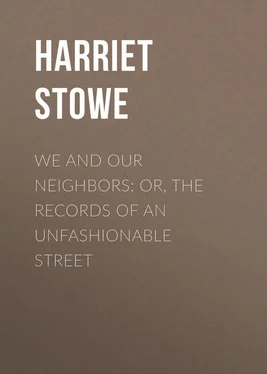Harriet Stowe - We and Our Neighbors - or, The Records of an Unfashionable Street
Здесь есть возможность читать онлайн «Harriet Stowe - We and Our Neighbors - or, The Records of an Unfashionable Street» — ознакомительный отрывок электронной книги совершенно бесплатно, а после прочтения отрывка купить полную версию. В некоторых случаях можно слушать аудио, скачать через торрент в формате fb2 и присутствует краткое содержание. ISBN: , Жанр: foreign_prose, на английском языке. Описание произведения, (предисловие) а так же отзывы посетителей доступны на портале библиотеки ЛибКат.
- Название:We and Our Neighbors: or, The Records of an Unfashionable Street
- Автор:
- Жанр:
- Год:неизвестен
- ISBN:http://www.gutenberg.org/ebooks/48603
- Рейтинг книги:4 / 5. Голосов: 1
-
Избранное:Добавить в избранное
- Отзывы:
-
Ваша оценка:
- 80
- 1
- 2
- 3
- 4
- 5
We and Our Neighbors: or, The Records of an Unfashionable Street: краткое содержание, описание и аннотация
Предлагаем к чтению аннотацию, описание, краткое содержание или предисловие (зависит от того, что написал сам автор книги «We and Our Neighbors: or, The Records of an Unfashionable Street»). Если вы не нашли необходимую информацию о книге — напишите в комментариях, мы постараемся отыскать её.
We and Our Neighbors: or, The Records of an Unfashionable Street — читать онлайн ознакомительный отрывок
Ниже представлен текст книги, разбитый по страницам. Система сохранения места последней прочитанной страницы, позволяет с удобством читать онлайн бесплатно книгу «We and Our Neighbors: or, The Records of an Unfashionable Street», без необходимости каждый раз заново искать на чём Вы остановились. Поставьте закладку, и сможете в любой момент перейти на страницу, на которой закончили чтение.
Интервал:
Закладка:
Not so the faded form I prize
And love, because its bloom is gone;
The glory in those sainted eyes
Is all the grace her brow puts on.
And ne'er was Beauty's dawn so bright,
So touching, as that form's decay
Which, like the altar's trembling light,
In holy luster wastes away."
"Certainly, not in the least like her ," he thought, and he resolved to dismiss the little hat with the humming bird, the golden mist of hair, and the glancing eyes, into the limbo of vain thoughts.
Mr. St. John, like many another ardent and sincere young clergyman, had undertaken to be shepherd and bishop of souls, with more knowledge on every possible subject than the nature of the men and women he was to guide.
A fastidious taste, scholarly habits, and great sensitiveness, had kept him out of society during all his collegiate days. His life had been that of a devout recluse. He knew little of mankind, except the sick and decrepid old women, whom he freely visited, and who had for nothing the vision of his handsome face and the charm of his melodious voice amid the dirt and discomforts of their sordid poverty. But fashionable young women, the gay daughters of ease and luxury, were to him rather objects of suspicion and apprehension than of attraction. If they flocked to his church, and seemed eager to enlist in church work under his leadership, he was determined that there should be no sham in it. In sermon after sermon, he denounced in stringent terms the folly and guilt of the sentimental religion which makes playthings of the solemn rituals of the church, which wears the cross as a glittering bauble on the outside, and shrinks from every form of the real self-denial which it symbolizes.
Angelique, by nature the most conscientious of beings, had listened to this eloquence with awful self-condemnation. She felt herself a dreadfully sinful little girl, that she had lived so unprofitable a life hitherto, and she undertook her Sunday-school labors with an intense ardor. When she came to visit in the poor dwellings from whence her pupils were drawn, and to see how devoid their life was of everything which she had been taught to call comfort, she felt wicked and selfish for enjoying even the moderate luxuries allowed by her father's reduced position. The allowance that had been given her for her winter wardrobe seemed to be more than she had a right to keep for herself in face of the terrible destitutions she saw. Secretly she set herself to see how much she could save from it. She had the gift of a quick eye and of deft fingers; and so, after running through the fashionable shops of dresses and millinery to catch the ideal of the hour, she went to work for herself. A faded merino was ripped, dyed, and, by the aid of clever patterns and skillful hands, transformed into the stylish blue suit. The little blue velvet hat had been gathered from the trimmings of an old dress. The humming bird had been a necessary appendage, to cover the piecing of the velvet; and thus the outfit which had called up so many alarmed scruples in Mr. St. John's mind was as completely a work of self-denial and renunciation as if she had come out in the black robe of a Sister of Charity.
The balance saved was, in her own happy thought, devoted to a Christmas outfit for some of the poorest of her scholars, whose mothers struggled hard and sat up late washing and mending to make them decent to be seen in Sunday-school.
But how should Mr. St. John know this, which Angie had not even told to her own mother and sisters? To say the truth, she feared that perhaps she might be laughed at as Quixotic, or wanting in good sense, in going so much beyond the usual standard in thoughtfulness for others, and, at any rate, kept her own little counsel. Mr. St. John knew nothing about women in that class of society, their works and ways, where or how they got their dresses; but he had a general impression that fashionable women were in heathen darkness, and spent on dress fabulous amounts that might be given to the poor. He had certain floating views in his mind, when further advanced in his ministry, of instituting a holy sisterhood, who should wear gray cloaks, and spend all their money and time in deeds of charity.
On the present occasion, he could see only the very patent fact that Angelique's dress was stylish and becoming to an alarming degree; that, taken in connection with her bright cheeks, her golden hair, and glancing hazel eyes, she was to the full as worldly an object as a blue-bird, or an oriole, or any of those brilliant creatures with which it has pleased the Maker of all to distract our attention in our pilgrimage through this sinful and dying world.
Angie was so far from assuming to herself any merit in this sacrifice that her only thought was how little it would do. Had it been possible and proper, she would have willingly given her ermine cape to the poor, wan little child, to whom the mere touch of it was such a strange, bewildering luxury; but she had within herself a spice of practical common sense which showed her that our most sacred impulses are not always to be literally obeyed.
Yet, while the little scarred cheek was resting on her ermine in such apparent bliss, there mingled in with the thread of her instructions to the children a determination next day to appraise cheap furs, and see if she could not bless the little one with a cape of her very own.
Angie's quiet common sense always stood her in good stead in moderating her enthusiasms, and even carried her at times to the length of differing with the rector, to whom she looked up as an angel guide. For example, when he had expatiated on the propriety and superior sanctity of coming fasting to the holy communion, sensible Angie had demurred.
"I must teach my class," she pleaded with herself, "and if I should go all that long way up to church without my breakfast, I should have such a sick-headache that I couldn't do anything properly for them. I'm always cross and stupid when that comes on."
Thus Angie concluded by her own little light, in her own separate way, that "to do good was better than sacrifice." Nevertheless, she supposed all this was because she was so low down in the moral scale, for did not Mr. St. John fast? – doubtless it gave him headache, but he was so good he went on just as well with a headache as without – and Angie felt how far she must rise to be like that.
"There now," said Jim Fellows, triumphantly, to Alice, as they were coming home, "didn't you see your angel of the churches looking in a certain direction this morning?"
Alice had, as a last resort, a fund of reserved dignity which she could draw upon whenever she was really and deeply in earnest.
"Jim," she said, without a smile, and in a grave tone, "I have confidence that you are a true friend to us all."
"Well, I hope so," said Jim, wonderingly.
"And you are too kind-hearted and considerate to wish to give real pain."
"Certainly I am."
"Well, then, promise me never to make remarks of that nature again, to me or anybody else, about Angie and Mr. St. John. It would be more distressing and annoying to her than anything you could do; and the dear child is now perfectly simple-hearted and unconstrained, and cheerful as a bird in her work. The least intimation of this kind might make her conscious and uncomfortable, and spoil it all. So promise me now."
Jim eyed his fair monitress with the kind of wicked twinkle a naughty boy gives to his mother, to ascertain if she is really in earnest, but Alice maintained a brow of "sweet, austere composure," and looked as if she expected to be obeyed.
"Well, I perfectly long for a hit at St. John," he said, "but if you say so, so it must be."
"You promise on your honor?" insisted Alice.
"Yes, I promise on my honor; so there!" said Jim. "I won't even wink an eyelid in that direction. I'll make a perfect stock and stone of myself. But," he added, "Jim can have his thoughts for all that."
Читать дальшеИнтервал:
Закладка:
Похожие книги на «We and Our Neighbors: or, The Records of an Unfashionable Street»
Представляем Вашему вниманию похожие книги на «We and Our Neighbors: or, The Records of an Unfashionable Street» списком для выбора. Мы отобрали схожую по названию и смыслу литературу в надежде предоставить читателям больше вариантов отыскать новые, интересные, ещё непрочитанные произведения.
Обсуждение, отзывы о книге «We and Our Neighbors: or, The Records of an Unfashionable Street» и просто собственные мнения читателей. Оставьте ваши комментарии, напишите, что Вы думаете о произведении, его смысле или главных героях. Укажите что конкретно понравилось, а что нет, и почему Вы так считаете.












